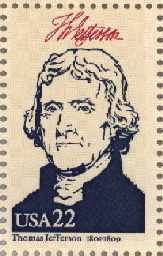
To Dr. Benjamin Rush Monticello, September 23, 1800DEAR SIR, -- I have to acknowledge the receipt of your favor of Aug. 22, and to congratulate you on the healthiness of your city. Still Baltimore, Norfolk & Providence admonish us that we are not clear of our new scourge. When great evils happen, I am in the habit of looking out for what good may arise from them as consolations to us, and Providence has in fact so established the order of things, as that most evils are the means of producing some good. The yellow fever will discourage the growth of great cities in our nation, & I view great cities as pestilential to the morals, the health and the liberties of man. True, they nourish some of the elegant arts, but the useful ones can thrive elsewhere, and less perfection in the others, with more health, virtue & freedom, would be my choice. I agree with you entirely, in condemning the mania of giving names to objects of any kind after persons still living. Death alone can seal the title of any man to this honor, by putting it out of his power to forfeit it. There is one other mode of recording merit, which I have often thought might be introduced, so as to gratify the living by praising the dead. In giving, for instance, a commission of chief justice to Bushrod Washington, it should be in consideration of his integrity, and science in the laws, and of the services rendered to our country by his illustrious relation, &c. A commission to a descendant of Dr. Franklin, besides being in consideration of the proper qualifications of the person, should add that of the great services rendered by his illustrious ancestor, Bn Fr, by the advancement of science, by inventions useful to man, &c. I am not sure that we ought to change all our names. And during the regal government, sometimes, indeed, they were given through adulation; but often also as the reward of the merit of the times, sometimes for services rendered the colony. Perhaps, too, a name when given, should be deemed a sacred property. I promised you a letter on Christianity, which I have not forgotten. On the contrary, it is because I have reflected on it, that I find much more time necessary for it than I can at present dispose of. I have a view of the subject which ought to displease neither the rational Christian nor Deists, and would reconcile many to a character they have too hastily rejected. I do not know that it would reconcile the _genus irritabile vatum_ who are all in arms against me. Their hostility is on too interesting ground to be softened. The delusion into which the X. Y. Z. plot shewed it possible to push the people; the successful experiment made under the prevalence of that delusion on the clause of the constitution, which, while it secured the freedom of the press, covered also the freedom of religion, had given to the clergy a very favorite hope of obtaining an establishment of a particular form of Christianity thro' the U. S.; and as every sect believes its own form the true one, every one perhaps hoped for his own, but especially the Episcopalians & Congregationalists. The returning good sense of our country threatens abortion to their hopes, & they believe that any portion of power confided to me, will be exerted in opposition to their schemes. And they believe rightly; for I have sworn upon the altar of god, eternal hostility against every form of tyranny over the mind of man. But this is all they have to fear from me: & enough too in their opinion, & this is the cause of their printing lying pamphlets against me, forging conversations for me with Mazzei, Bishop Madison, &c., which are absolute falsehoods without a circumstance of truth to rest on; falsehoods, too, of which I acquit Mazzei & Bishop Madison, for they are men of truth. But enough of this: it is more than I have before committed to paper on the subject of all the lies that has been preached and printed against me. I have not seen the work of Sonnoni which you mention, but I have seen another work on Africa, (Parke's,) which I fear will throw cold water on the hopes of the friends of freedom. You will hear an account of an attempt at insurrection in this state. I am looking with anxiety to see what will be it's effect on our state. We are truly to be pitied. I fear we have little chance to see you at the Federal city or in Virginia, and as little at Philadelphia. It would be a great treat to receive you here. But nothing but sickness could effect that; so I do not wish it. For I wish you health and happiness, and think of you with affection. Adieu. |
